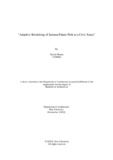Adaptive rethinking of Jamuna Future Park as a Civic Space
Abstract
Democratic societies thrive on spatial settings which cater to the innate need for socializing
for human beings. In the era of globalization and late-stage capitalism, it is crucial to
understand the intricacies of economics and societies. This thesis aims to explore the
deteriorating fabric of civic textures in Dhaka’s cityscape and create a hypothesis which
proposes an alternative solution to a central node of the city’s map.
Dhaka is seeing its civic spaces, from the local tong (tea stall) to national icons disintegrating
into remnants of the past with the overwhelming force of the free market. The deterioration of
‘social scapes’ is undoubtedly a reflection of the changing consciousness of her inhabitants.
Can architecture be a defining tool to reconcile society and economics to facilitate politics?
This paper tries to rethink an existing shopping mall, Jamuna Future Park, in a given plot of
land – to create a dynamic urban center which will provide human-centered experiences and
to help contribute to the overall neighborhood area development in one of the prime nodes of
Dhaka city.

